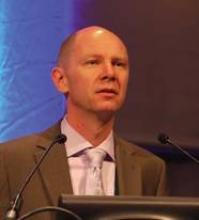AMSTERDAM – Up to 43% of elderly patients with diffuse large B cell lymphoma might be spared radiotherapy for bulky disease, if research suggesting that there is no additional benefit when using a standard chemotherapy regimen is confirmed.
In a prospective study from Germany, patients who achieved a complete remission (CR) or complete remission unconfirmed (CRu) with R-CHOP-14 plus two subsequent doses of rituximab (Rituxan) gained no additional benefit in event-free survival (EFS), progression-free survival (PFS), or overall survival (OS), compared with a historical prospective cohort.
However, patients who did not achieve a CR/CRu following the chemotherapy did appear to benefit from radiotherapy to bulky disease, with higher rates on all three measures in the RICOVER-60-No-Rx trial, a German High Grade Non-Hodgkin’s Lymphoma Study Group (DSHNHL) trial,
"The role of radiotherapy in the treatment of aggressive non-Hodgkin’s lymphoma is rather unclear, especially in the rituximab era, where systemic chemotherapy has become highly effective," Dr. Gerhard Held said at the annual congress of the European Hematology Association.
"The question arises if a local therapeutic modality like radiotherapy provides benefit to patients or [if it is] just adding additional toxicity," Dr. Held of Saarland University Hospital, Homburg, Germany, added.
The RICOVER-60-No-Rx trial resulted from a protocol amendment of the previously reported RICOVER-60 trial conducted in elderly patients with diffuse large B-cell lymphoma (DLBCL). The latter involved more than 1,200 men and women with DLBCL who were aged 61-80 years.
RICOVER-60 had a 2x2 factorial design and compared six or eight cycles of cyclophosphamide, doxorubicin, vincristine, and prednisone given for 14 days (CHOP-14) with or without additional rituximab (R-CHOP-14). Patients with extranodal or bulky disease, defined as a tumor of more than 7.5 cm in diameter, received additional involved-field radiotherapy of 36 Gy.
The trial’s results (Lancet Oncol. 2008;9:105-16) showed a clear benefit of adding rituximab to the CHOP-14 regimen. The aim of the RICOVER-60-No-Rx study was to look more specifically at the role of radiotherapy in patients who had received the chemotherapy regimen.
In total 166 patients received additional chemotherapy without radiotherapy after the protocol amendment, and outcome data on these patients were compared with data on 306 patients who had received R-CHOP-14 plus two additional doses of rituximab and radiotherapy to bulky disease in the RICOVER-60 trial.
Dr. Held reported that, compared with the RICOVER-60 population, those in the RICOVER-60-No-Rx trial were older (median age of 69 vs. 71 years, P = .018), more likely to have advanced (stage III/IV) disease (50% vs. 60%, P = .037), and have extranodal involvement (50% vs. 63%, P = .024). In contrast, patients in the RICOVER-60 study were more likely to have bulky disease (35 vs. 29%, P = .024).
After a median observation time of 39 months, EFS (80% vs. 54%; P = .001), PFS (88% vs. 62%; P less than .001), and OS (90% vs. 65%; P = .001) were initially higher when comparing the RICOVER-60 cohort with the RICOVER-No-Rx cohort. However, taking protocol violations and the differences in demographics into consideration, there was no difference in the three measures between the groups overall (3-year EFS and PFS: 84% vs. 75%; P = .430); OS (87% vs. 79%; P = .839). Only patients who had not adequately responded to R-CHOP 14 appeared to benefit.
This was a not a randomized investigation, Dr. Held noted, and so of course further clarification of the role of radiotherapy in DCLBL is needed. To that end, the DSHNHL UNFOLDER trial is underway; this trial is looking look at the use of radiotherapy to bulky lesions vs. observation after six cycles of treatment with R-CHOP-14 or R-CHOP 21.
Computed tomography rather than positron emission tomography was used to stage patients, Dr. Aaron Polliack, emeritus professor of hematology and former head of the lymphoma and leukemia unit at Hadassah University Hospital in Jerusalem, noted during discussion that followed.
The results of the current trial therefore warrant caution in their interpretation, suggested Dr. Polliack, who is editor in chief of the journal Leukemia and Lymphoma and not involved in the study. He further commented that no decision can truly be made on the value of radiotherapy in this clinical situation until further data from the UNFOLDER and other studies are available.
The RICOVER-60-No-Rx trial was supported by Deutsche Krebshilfe and the original RICOVER-60 trial by Roche. Dr. Held disclosed receiving travel grants from Roche. Dr. Polliack had no conflicts of interest.


